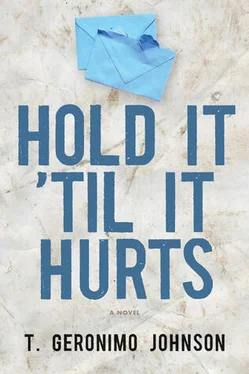“We have two hours left.”
“Take me back now,” said Achilles.
At Mrs. Delesseppes’s, he tossed pebbles at Ines’s window, pleading for her to come down or let him in, which she refused until he said, “Wexler isn’t dead.”
She came outside but remained a few feet from him, shaking her foot as she did when expecting bad news. He couldn’t see them but knew there were two tiny indentations in her lower lip.
He showed her the photograph of the squad under the airplane wing together, headed out for R&R. “You’re right. Wexler isn’t dead.”
“I heard that.” She slapped the air.
“I didn’t know how to tell you. I’ve wanted to say it since the day we met. My brother is in the morgue.” He pointed to the photo. “My brothers,” he said. “These are my brothers. All of them.”
He pointed to Merriweather. “This is Merriweather.”
He pointed to Wages. “This is Wages.”
He pointed to Wexler. “This is Wexler.”
He pointed to Troy. “This is Troy. He’s in the morgue. I identified the body in Atlanta.” He couldn’t lie anymore, but the truth choked him. Unable to finish, his body slipped out of his control, all snot and tears, What a fag. Don’t be a sissy, Connie. How can you think under fire all pussy-lipped? Is that all snot, that slimy skein stretching across his fingers, that salty, bitter assault on his tongue? Ines put her hand to her mouth and guided him to a seat on the porch stairs. He didn’t talk Troy out of enlisting, he wasn’t there when Troy needed him, he didn’t do enough, he didn’t even avenge Troy’s death.
Ines hushed him, leading him into the house, his cries echoing in the living room and amplified by the hall. At last they were in the kitchen, where Ines gave him a paper bag to breath into, and Achilles spoke through the bag. “Dead, so many.” He tried to say more, but all he could get out was that he felt like he was dying, needed to die, didn’t deserve to live, why hadn’t he died, why not him?
“I didn’t do enough. I tried. I swear I tried.”
A few bleary-eyed strangers appeared in the doorway to the kitchen. Ines waved them off. Achilles turned away and calmed himself.
“Oh, no.” Ines squeezed Achilles’s hand. “Achilles, baby, I know you did.”
She was insistent on this point, and the more insistent she was, the worse Achilles felt, until a sob escaped him, and that look on her face, like the look on his mother’s face the night Troy first came home, the look that meant she took his tears to mean something they didn’t, and the tighter Ines held him the more he melted into her arms, and the more he did, the more he despised himself for crying, for failing his brother, for needing her so, for only doing his best, which his drill sergeant always said was just enough to get you killed.
“My poor Achilles. And they said there’d never be another. And Troy, poor Troy.”
OVER THE NEXT FEW WEEKS, ACHILLES INCREASINGLY REGRETTED opening up to Ines that night. The week before the funeral was especially hard. He hadn’t told her much more that evening, stopping short at her reaction to learning that Troy was adopted. Now every day she shared a new tidbit about transracial adoption, prefaced always by “Poor Troy.” Not in the motherly voice she used when his favorite team lost; it was a reassuring voice, the voice of heartfelt commiseration, a miracle seemingly reserved for women: the ability to care, really care, about events that affected others. At times this emotional proxy was soothing. When his frustration reached the limits of his expression — a shake of the head, a curse, a groan — she took over with a heartfelt sigh, a breathy murmur, a doleful moan, her profound empathy his release. Ines was his professional mourner, for which he was grateful until she began mourning his brother.
Poor Troy: That’s cultural genocide. It robs the black community of its most precious gift, children. Whites aren’t equipped to socialize a black child. Even when raised by their own parents, black children raised in white neighborhoods have identity issues. They’re never prepared for the real world. He doesn’t know his heritage, or why people treat him as they do. It’s like when you let a puppy sleep in your bed and lie in your lap and jump up and lick people in the face and everyone thinks it’s so cute, then the puppy grows, can’t fit in the bed, is too heavy for your lap, and scares people when he jumps. He’s a sweet puppy inside, but everyone sees a ferocious beast.
Achilles resented the unintentional comparison, the implication that his parents had been less than earnest in their efforts. Achilles and Troy had grown up in a mixed neighborhood, equal parts Catholic and Protestant, with some Jews mixed in. Their parents for years allowed Christmas without Mass and Easter without new suits. When Achilles entered sixth grade they even tried Kwanzaa, stopping on the third day only because of Achilles’s protest. Though one had seven candles and the other nine, too many visitors mistook the kinara for a menorah, resulting in confrontations during recess when people asked questions he couldn’t answer. After working hard to fit in during elementary school, he didn’t want to blow it by showcasing his difference, or besting any of his friends at sports.
Everything was O.K. with his friends — until they met his mom, or asked about his real name, or met his brother. A sensation that it was only temporary hung over most relationships. Hell, one day he turns eight, the next he has a brother.
Achilles wasn’t the only one put out by Troy’s sudden appearance. Ken was equally distressed. Achilles and Ken would ride bikes and catch frogs and often eat at each other’s houses. They were the best kickball players in the neighborhood and started a gang of two, their biceps emblazoned with magic marker tattoos — a one in a circle. Achilles preferred playing at Ken’s house, because otherwise Troy would march out demanding to play and invariably didn’t swing the bat fast enough or kick hard enough or run quickly enough, and someone would tease him, and Achilles would try to ignore the whole thing. This strategy worked until one afternoon when they were playing kickball and Troy missed the ball on the last play. Ken yelled “Stupid,” feigning a slap. Troy flinched and ran, looking back over his shoulder at Ken while running at full speed until tripping over his own feet, scraping his knee on the hot gravel and yelping while he grabbed his right ankle like a baby. That was okay until Troy, seeing his mother in the window, started swinging, even though he only came up to Ken’s chest. Even that was okay until Achilles, trying to break them up, accidentally elbowed Ken in the nose. Ken said, “He doesn’t even like you. He’s not even black.”
As Achilles helped Troy to his feet, Troy’s shirt slipped up to his shoulder revealing a crude circle with a one in the middle. Troy shot him a hateful look and placed his hand over the tattoo like it was a wound. While Achilles watched, Troy stormed into the house rubbing dirt into his tattoo and Ken slipped into the woods rubbing spit onto his. Troy told his mother that Ken had called Achilles Black! She gathered them to her lap and said they were his parents, always! When their father came home, he said, “We’re your parents and love you both like you’re our own children.”
Troy persisted. “But Ken said Achilles is black and he’s not my brother.”
Their father placed Achilles and Troy on the corduroy couch, their legs grazing the carpet, and sat on the ottoman facing them.
“Your skin color doesn’t matter, and never let anyone tell you otherwise. You could just as well be purple. In fact, here we’re all purple from now on. Purple people eaters.” Troy laughed. That was his favorite story. Their father rubbed their heads and explained that anyone who said race mattered was ignorant. But words weren’t enough, and, soon after, their father started what Achilles and Troy would later jokingly refer to as the diversity action plan. As they liked to say, their father invented DAP.
Читать дальше












